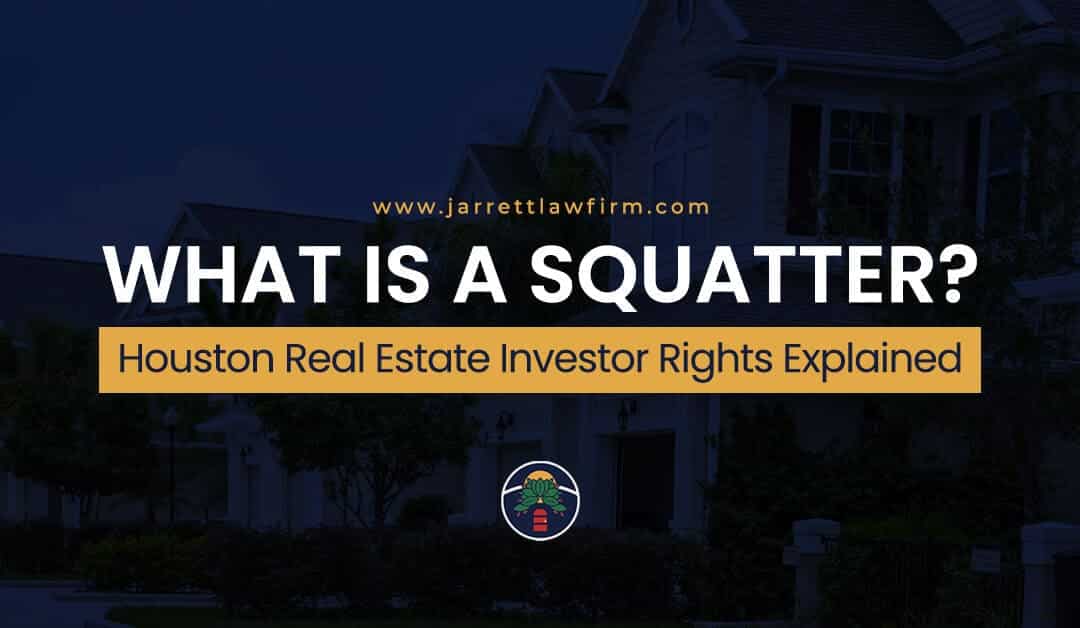
What is a squatter, and why does it matter for you as a real estate investor? When you invest in real estate, protecting your property is essential, especially in a bustling city like Houston.
But what happens when someone occupies your property without your permission? This situation can be more than frustrating—it can challenge your legal rights as a property owner.
Squatters may gain certain legal protections under Texas law if specific conditions are met. Understanding how squatters’ rights work and how they can affect your investments is crucial.
Let’s explore what it means to encounter a squatter in Houston and how you can take steps to safeguard your property and your investment.
What Is A Squatter and How Can They Affect Your Rights With an Adverse Possession Claim?
Understanding Squatters and Their Impact
A squatter is someone who occupies a property unlawfully without the property owner’s permission.
They might move into vacant properties, abandoned buildings, or even rental properties, creating a complex situation for rightful property owners.
In Texas, squatters may claim legal ownership of a property through a process known as adverse possession, which can have lasting effects on your rights as a property owner.

How Does Adverse Possession Work Under Texas Law?
Adverse possession laws in Texas allow a squatter to claim ownership of a property if they meet specific conditions over an extended period of time. These conditions include:
- Actual possession of the property
- Continuous possession for the required period (as defined by state laws)
- Use of the property in a way that is open, visible, and without the owner’s permission
For example, a squatter who has lived in a vacant property for ten years and has paid property taxes might qualify to claim legal title under adverse possession laws.
Why Squatter’s Rights Matter for Property Owners
Squatters’ rights laws can seem surprising to property owners, but they are rooted in legal doctrines designed to prevent abandoned or unoccupied areas from falling into disrepair.
However, these laws also create challenges. A squatter who meets the conditions for an adverse possession claim could ultimately gain legal title to the property, even if they originally unlawfully lived there.
This underscores the importance of staying informed about Texas’ specific laws surrounding adverse possession.
Steps to Prevent Adverse Possession Claims
To protect your property title, there are several steps you can take:
- Maintain Active Ownership: Regularly inspect your vacant property and vacant land. This helps you catch any illegal occupants early.
- Secure Your Property: Install locks, fencing, and “No Trespassing” signs to make it clear the property is private.
- Address Issues Promptly: If you notice illegal occupation, act quickly. Filing a police report with the local police department or contacting local law enforcement is a good first step.
Your property is one of your most valuable assets, and safeguarding it requires swift, informed action.

At Jarrett Law, we are here to support you every step of the way, ensuring the eviction process runs smoothly and efficiently.
Call us today at 346-683-2240 for a consultation to secure your property rights and get the legal guidance you need to move forward with confidence.
How to Remove Squatters Legally
If a squatter refuses to leave, it’s essential to follow the proper legal process to remove them.
In Texas, this often involves filing a formal eviction notice and proceeding through the eviction process.
Avoid taking matters into your own hands, as this can complicate the situation legally. Instead, consult a real estate attorney for guidance on how to evict squatters in compliance with state and local laws.
Can Paying Property Taxes Strengthen a Squatter’s Claim?
In some cases, squatters attempt to bolster their adverse possession claims by paying property taxes. This can complicate matters further for rightful owners.
It’s critical to stay current on your property taxes to minimize the risk of such claims.
The Role of Local Authorities in Enforcing Your Rights
State and local laws enforced differ greatly when it comes to evicting squatters. While local law enforcement can sometimes help remove squatters, their involvement often depends on whether the situation is viewed as a civil matter rather than a criminal one.
Partnering with a real estate attorney ensures you navigate the legal aspects effectively.

Protecting Your Property From Illegal Occupants
Understanding Texas’ adverse possession laws is crucial for safeguarding your investment. By taking proactive measures, staying informed about eviction laws, and working with professionals when needed, you can prevent squatters from claiming ownership of your property.
Whether you’re dealing with vacant or foreclosed properties or rental property issues, vigilance is key to maintaining your rights as the rightful property owner.
Fighting Against a Sqautter’s Legal Adverse Possession Claim
When someone unlawfully occupies your property and claims ownership under adverse possession laws, it can feel frustrating and overwhelming. As the rightful owner, you have options to fight these claims and protect your legal rights. Understanding the law and taking the correct steps are key to resolving the situation effectively.
Recognizing the Grounds for Adverse Possession
Texas law requires squatters to meet strict criteria before they can successfully claim ownership through adverse possession. These criteria include:
- Continuous possession of the property for a legally defined period of time
- Visible and open use of the property
- Evidence that the squatter acted without the owner’s permission
Squatters may also strengthen their legal claim by paying property taxes. Knowing these conditions helps you anticipate their potential arguments and build your defense.
Taking Action to Protect Your Rights
- Issue a Written Notice: The first step in reclaiming your property is serving a formal eviction notice to the squatter. This establishes that they are unlawfully occupying your private property.
- Understand State and Local Laws: Adverse possession laws vary by state, so it’s essential to follow Texas-specific guidelines. Research the legal processes involved and the required period for continuous possession under state law.

Navigating the Eviction Process
- File a Civil Lawsuit If Needed: If the squatter’s rights argument continues, initiating a civil lawsuit ensures the legal system can address the dispute. A court order will often clarify who the actual owner is and enforce the removal of the squatter.
- Follow Proper Legal Processes: Avoid taking matters into your own hands. Self-help actions, like attempting to force the squatter out, can lead to legal complications. Instead, work through the eviction process as outlined by Texas law.
Preventing Future Issues
- Secure Abandoned Properties: Regularly inspect your vacant or unoccupied areas to ensure they are not illegally occupied. Locks, fences, and clear “No Trespassing” signs can deter squatters from moving in.
- Work With a Property Management Company: Professional property managers help maintain your rental property, screen quality tenants, and respond quickly to any unauthorized use of your property.
- Keep Records and Legal Documents Organized: Having clear documentation, such as a lease agreement or property ownership papers, strengthens your position if a squatter challenges your legal right to the property.

When to Seek Professional Help
Adverse possession claims can involve complex legal doctrines, making it vital to seek guidance from a real estate attorney. They can help you navigate the legal aspects, file necessary legal documents, and represent you in court if needed. Addressing the situation promptly and professionally ensures you remain the rightful owner of your property and avoid further complications.
Fighting against a squatter’s claim requires persistence and a solid understanding of Texas’ laws. By taking proactive steps and working within the legal system, you can protect your property from unlawful claims and secure your legal rights.
Need Help Securing Your Property Rights in Houston?
At Jarrett Law, we understand that protecting your property rights is a top priority.
Whether you’re dealing with tenants who refuse to leave, unauthorized occupants, or squatters attempting to claim ownership, navigating Texas eviction laws can feel overwhelming. That’s why we provide personalized legal support to help you resolve these challenges quickly and effectively.
Comprehensive Eviction Assistance
When it comes to evictions, every step of the process matters. At Jarrett Law, we help you handle each stage, from serving the proper eviction notice to representing you in court.
Texas eviction laws, outlined in the Texas Property Code Chapter 24, require strict adherence to legal procedures. Missing even a single detail could delay your case or risk an unfavorable outcome.
With our guidance, you stay on track and protect your legal rights.
Resolving Disputes Through Mediation
Sometimes, the best path forward is finding a solution outside the courtroom. We offer mediation services to landlords and property managers, helping you and your tenant reach an agreement that benefits both parties.
Mediation can save you time, reduce legal expenses, and maintain the integrity of your long-term investments.
Defending Your Property Rights in Court
If mediation isn’t an option, our experienced legal team represents you in court to ensure your side is heard.
We prepare your case thoroughly, filing necessary documents and presenting evidence to protect your interests as a property owner.
From rental properties to abandoned or unoccupied areas, we help you regain control of what’s rightfully yours.

Take Action Today
Your property is one of your most valuable assets, and safeguarding it requires swift, informed action.
At Jarrett Law, we are here to support you every step of the way, ensuring the eviction process runs smoothly and efficiently.
Call us today at 346-683-2240 for a consultation to secure your property rights and get the legal guidance you need to move forward with confidence.


